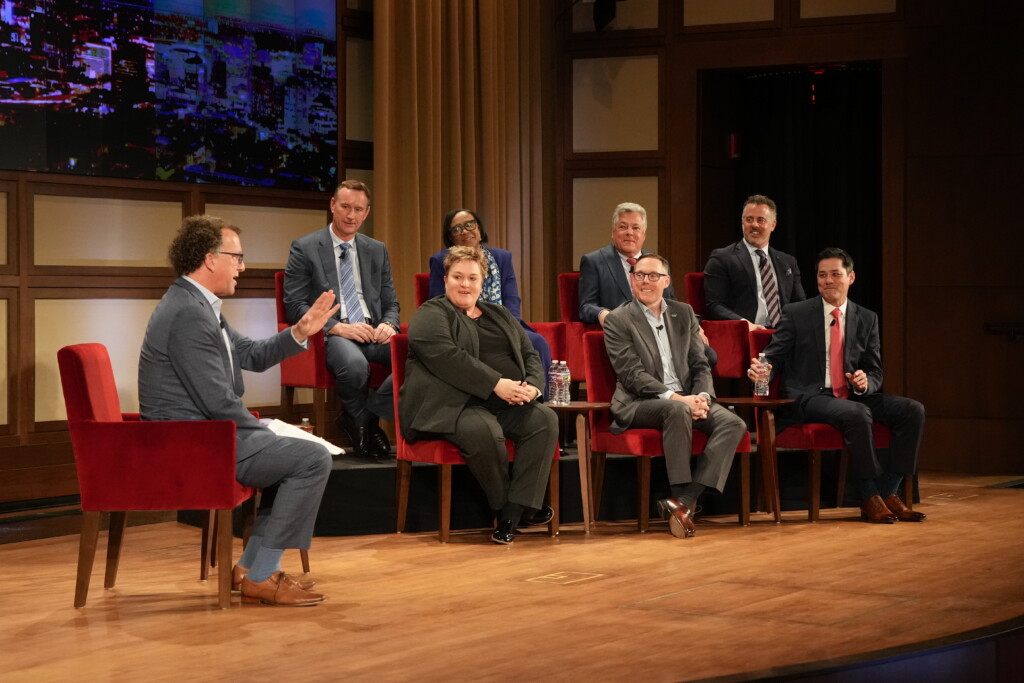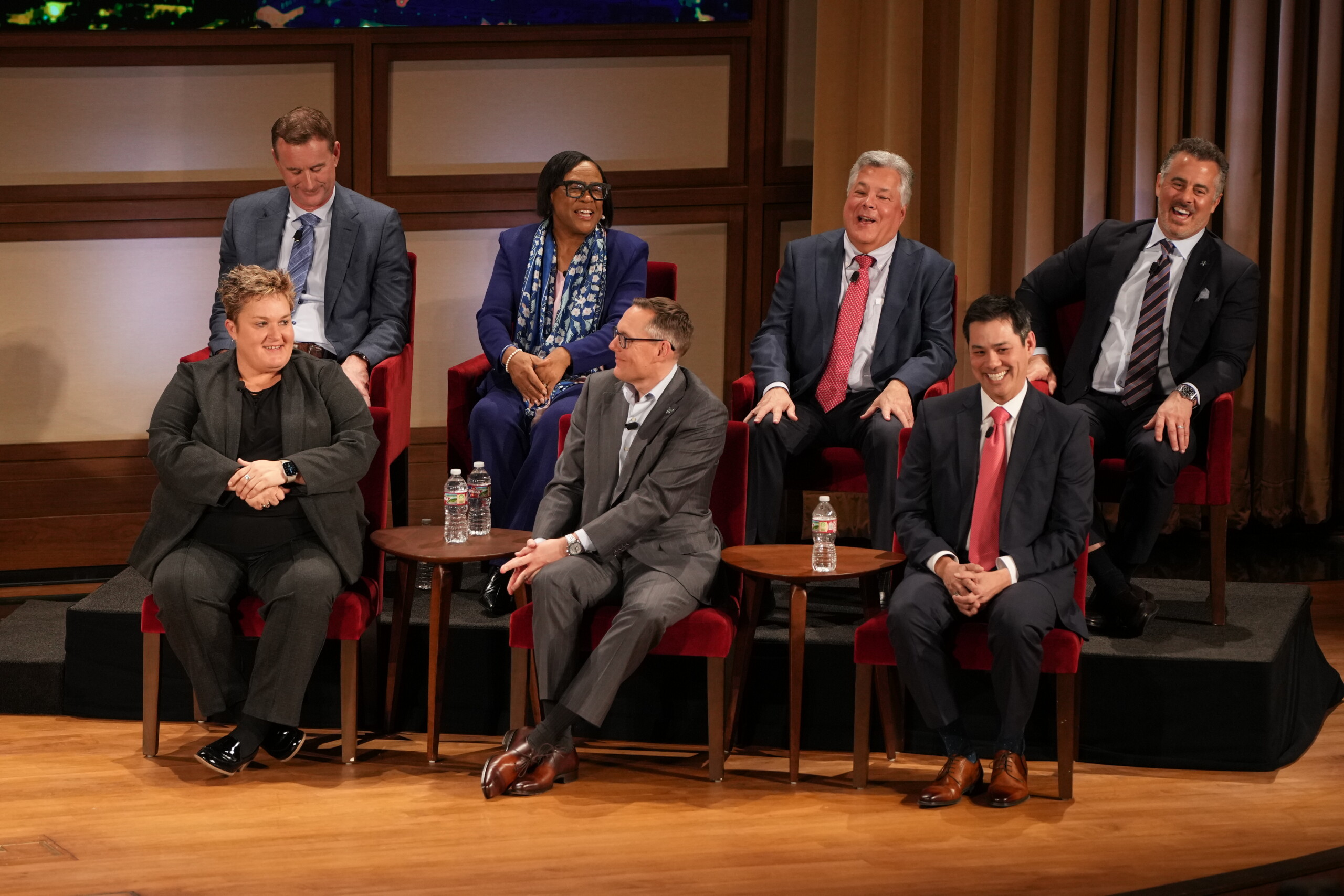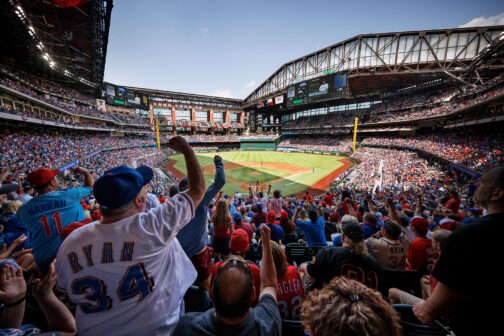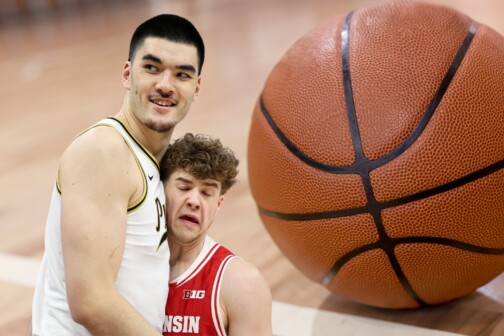The Dallas Sports Commission and the Sports Business Journal brought together Dallas-Fort Worth’s top industry leaders to celebrate North Texas being named the nation’s best market for sports business. The editors of the SBJ, which released the list last year, gave Dallas a perfect 100 score and called North Texas “a primary destination for many people looking for lower taxes, lower cost of living, and a business-friendly regulatory environment.”
“The region has great teams, unbelievable venues, unbelievable support and camaraderie, and collaboration of the leaders in the marketplace who know how to pull together scalable events,” said Abe Madkour, SBJ’s editor and publisher. “It has great quality of life, great airports, a lot of corporate sponsors, and a lot of agencies here. It was seen as the best place to do the business of sports in America.”
As part of the evening, Madkour moderated a panel with Stars CEO Brad Alberts, Mavericks CEO Cynt Marshall, Rangers COO Neil Leibman, Cowboys EVP of business operations Chad Estes, FC Dallas’ COO and CFO Jimmy Smith, Dallas Wings CEO Greg Bibb, and Dallas Sports Commission Executive Director Monica Paul.
This conversation has been edited for clarity and brevity.
SBJ: What is the secret sauce that makes Dallas the No. 1 sports business city in America?
MONICA PAUL: “I’ve been here for 15 years, and I can say its the partnerships. Anytime we’ve gone after an event or bid on something or tried to be aggressive in bringing events here—large or small—everyone around us has stepped up to say, ‘We want to be your partner.’ All of the owners, all of the teams, and all of the facilities that we have here invest a lot to to ensure that we’re a world class city. Our regional partners are a big part of this, as well, because it takes all of us collectively, from Dallas to Fort Worth to Arlington to Frisco and everywhere in between, to make us a successful region.”
CHAD ESTES: “I think the No. 1 key to the success of this region is Monica Paul. She’s the best at what she does and gives us such a head start at landing huge events. When I moved here from Cleveland, the first thing that struck me was the optimism of the market. Everybody’s doing something they’re excited about in this city, and this city has a desire to be the best. When I think about the Dallas Cowboys and our demand since we built a new stadium in 2009, our intrigue is partially fueled by the growth of the economy in this market.”
BRAD ALBERTS: “There’s an entrepreneurial spirit in this city combined with on-field success. When the Rangers win the World Series, that pushes all us other teams to go and win it all. The fans are great and Dallas, being as big it is, still has a small, intimate feeling to it.”
GREG BIBB: “I came from Washington D.C., and its a great place—the owners there are committed—but there’s no place like North Texas. This moment in time for DFW is unparalleled—and I don’t think we’ll ever see it happen again. Let’s think about it this way: If Texas was its own country, it would be the eighth largest economy in the world. And within Texas, the DFW region is the fastest-growing region in the country. You mix that in with committed ownership willing to invest in winning and prospering, successful leadership, and you put it all together it yields successful teams. Every team in Dallas has experienced significant recent success. So, we’re going to keep it going as long as we can.”
SBJ: Of the 100 most-watched television shows, 96 of them were sports, 93 were football, and 16 of those were Dallas Cowboy games. Chad, how do you continue to grow the most powerful brand in sports?
ESTES: “I’ve been at places where I execute on a plan and don’t get much of a result. But now I’m thankful to work for the Jones family because if we execute well on something, we’re going to get a big result. Our owner is not going to let us get complacent, so growth is constant. But a couple things we’re doing: we’re spending more time in Mexico. The NFL has increased its international efforts, and we’re staking our claim on the Mexico market and growing relationships with the fans there. We’re always putting emphasis on content—because content is always king. So, we’re riding the wave of the NFL, but our cheerleaders show is on Netflix, Jerry is getting a Netflix special coming out in the fall—which will be super interesting—so content continues to drive our market growth.”
SBJ: Another thing very hot in sports right now is the growth and energy around women’s sports. Greg, tell us more about the WNBA.
BIBB: “The WNBA is fortunate the be the oldest, most established women’s sports property in the world, and we’re riding the wave. Whatever business metric that you’re looking at, we’re experiencing double-digit growth. But the thing that excites me most is how people are investing in it. The valuations of women’s franchises were stagnate for what seemed like forever, but we just saw a National Women’s Soccer League franchise sell for $63 million and the buyers were quoted in the Los Angeles Times saying they got a good deal. So, I think that speaks volumes to where we are and where we’re going.”
SBJ: Another hot sport right now is soccer. Jimmy, how are you growing in this market and how are you attracting new fans?
JIMMY SMITH: “We’re in a very unique time right now with the World Cup coming soon and the MLS just signed a new TV deal with Apple TV—sorry [Cynt, Brad, and Neil. But, soccer is an international sport. It’s in 104 countries, and now is the perfect time for the sport. We have a new tournament, League’s Cup where MLS teams play against Liga MX teams, so we’re rallying around that unification. Additionally, for FC Dallas, we had Lionel Messi come in August to play, and since then we’ve been a different franchise. As a whole, we’ve seen our highest attendance ever as a franchise, and all the things are lining up for a great next few years.”
PAUL: “Of anybody up here on stage, I would not have expected the [television rights jab] from you, Jimmy.” [laughter]
SBJ: Don’t worry, I won’t ask how many people watch the MLS on Apple TV. … On that note, media markets are one of the most disruptive, unsettled marketplaces in sports right now; we’re seeing it on the NHL side specifically.
ALBERTS: “Yes, it’s the most complicated business problem I have ever faced in my career, and I think it’s something to which those of us who are in this world would probably all attest. It has interweavings in three leagues, and the legalities and complexities that go along with that, then you factor in the money, how it impacts how we build teams—there’s no clear solution. It’s unbelievable because we get CEOs of media companies, commissioners, and presidents all in a room together, and no one has a clear solution on how to fix it. So, we’re all sitting here, in a sense, paralyzed. But things literally change sometimes by the hour. A week before Amazon got involved, I don’t think anybody involved closely to this thing thought they’d really even be a big player in this, but here we are. Our collective leagues are still trying to figure out what that deal really means. When I break it down, all I really need to know is this: Do we have a deal to broadcast our games to our fans in October and how much are we going to make off the deal? And when no one out there can give me an answer and no one knows when they can answer me, it’s a very unsettling issue.”
CYNT MARSHALL: “But in the meantime, you figure out how to do great things for your fans, and so we struck a deal with WFAA Channel 8 to broadcast 10 games—13 in all including national broadcasts—to 7 million people. We’ve been wrestling with this for a long time. How do we increase viewership? But we really just sat down and decided we had to figure something out. So, yes the media rights landscape is complicated and we have all sorts of stuff to sort out in the long term, but what we do know is that 7 million people can access our games in the immediate future.”
SBJ: Neil, we’re seeing a couple trends in baseball. There were a lot of changes to the on-field product with the pitch timer, but also we’re seeing the advent of mixed-use developments and especially what the Rangers are doing around Globe Life Field. Tell us more.
NEIL LEIBMAN: “Yes, the attention spans are getting shorter, and with the new rules we have seen higher attendance and younger demographics, but mixed-use is really the key to everything right now. Arlington has been a model city for it, and we’re about to open the new Loews Hotel, which has 888 rooms. It’s going to be great for the Cowboys and all the other teams in the district. We’re opening an apartment complex, and we’re building retail inside Choctaw Stadium [the old Rangers ballpark]. The area is a mecca for growth and business interest. Five years from now it’s going to be very different.”
SBJ: Monica, the Dallas Sports Commission has been around now for 10 years, and you must feel pretty good about the progress you’ve made. In terms of the World Cup, how are you feeling about things?
PAUL: “From right out of the gates, Dallas was in position for the final, quite honestly—and we knew if it wasn’t the final we’d get a semi-final. But for so many reasons—the Men’s Final Four, the College Football Playoff National Championship, multiple Wrestlemanias, a record-breaking Women’s Final Four, and the Super Bowl—it doesn’t get any better than AT&T Stadium in terms of what FIFA is looking for. We’ve put on record-breaking major events and I think FIFA recognizes it. I’m not one to count my chickens before they hatch, I want to see it written on paper, but I’m very proud of all the work that has been done in the community. And at the end of the day, whatever Feburary 4 brings to us, this is a lasting legacy for this region and will be the largest event we probably host in my lifetime. So, regardless if its a final or semi-final, there’s much to celebrate.”
SBJ: What’s the biggest misconception about the Dallas sports business marketplace?
PAUL: “From an event standpoint, people sometimes think we only go after the major events, but honestly some of our youth, grass roots, or national cheerleader events are our bread and butter. Go ask the restaurants and hotels downtown about their performance in January, February, and March. It’s all due to the more than 65,000 cheerleaders and their moms and dads who come into town. Whether its soccer, volleyball, or climbing the youth events have opened up because of our great facilities.”
SBJ: What is the sports business story you’re most keeping an eye on?
LEIBMAN: “I think the biggest understatement of this discussion was yours Brad, when you said the media rights landscape was unsettling…”
ALBERTS: “It’s a disaster.”
LEIBMAN: “It worries us every day. Just last year, Dish Network takes our games off the air, and the No. 1 email I get everyday is from fans saying, ‘How can I watch the games? I’m a Dish Network customer.’ Because of all the contracts around this, league-wide contracts, and all the rules that go into sports broadcasting, there’s no clear answer on where this is headed. So, all I can say right now is we will broadcast our games next year, we’re going to make it work; here’s no clear answer on how or where, but we will figure it out.”
MARSHALL: “In addition to that, I’m keeping an eye on our new ownership [Sands Corp.]. I think the new ownership group is going to be great for Dallas. We’re going to invest a lot, not just in new facilities, but in the community and it’s going to be great. My old boss has money, my new boss has even more money, and I’m trying to find ways to spend it.”
ALBERTS: “I can’t wait to work with the Adelson family and Sands Corp. in town. Here in Texas, obviously, I’m keeping my eye on gambling. Sports betting and brick-and-mortar casinos have been in the news the last few years, and now with Sands owning the Mavericks, it’s going to continue to be in the news. Everybody up here was involved trying to get it legalized in the last legislative session, and I think we will all be together in that next year. It would be a big business driver here in the state of Texas.”
SBJur: Finally, Monica, we will let you have the last word. What’s one sporting event you want to bring to town?
PAUL: “We saw so much success from the Women’s Final Four, so I’m continuing down that path. I’d love to push for the WNBA All-Star game with the Wings. I think 2026 will be a huge success, but I want to bring the 2027 or 2031 Women’s FIFA World Cup here, as well. And, one that we have hosted before that needs to come back—you know it’s the Super Bowl.”
Author








